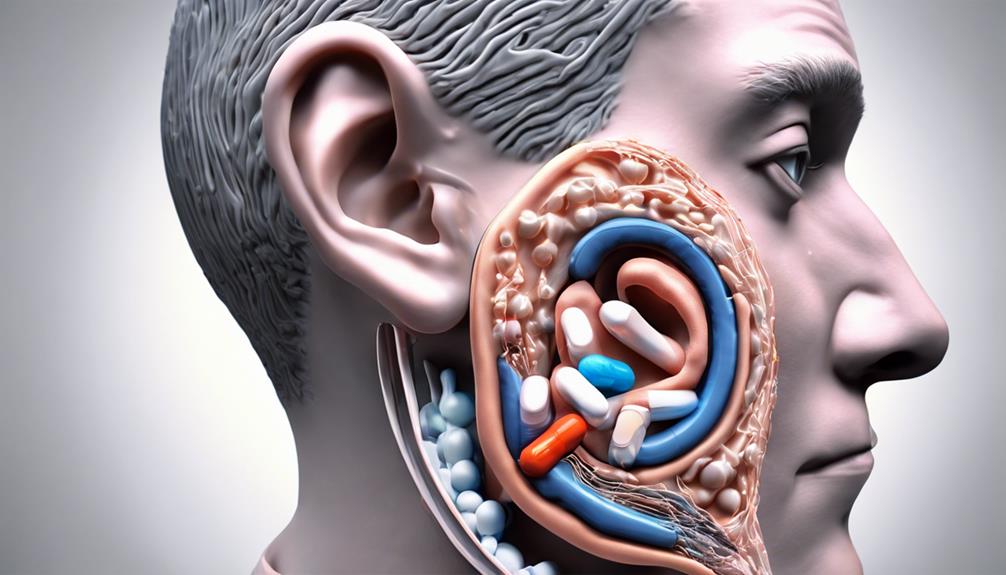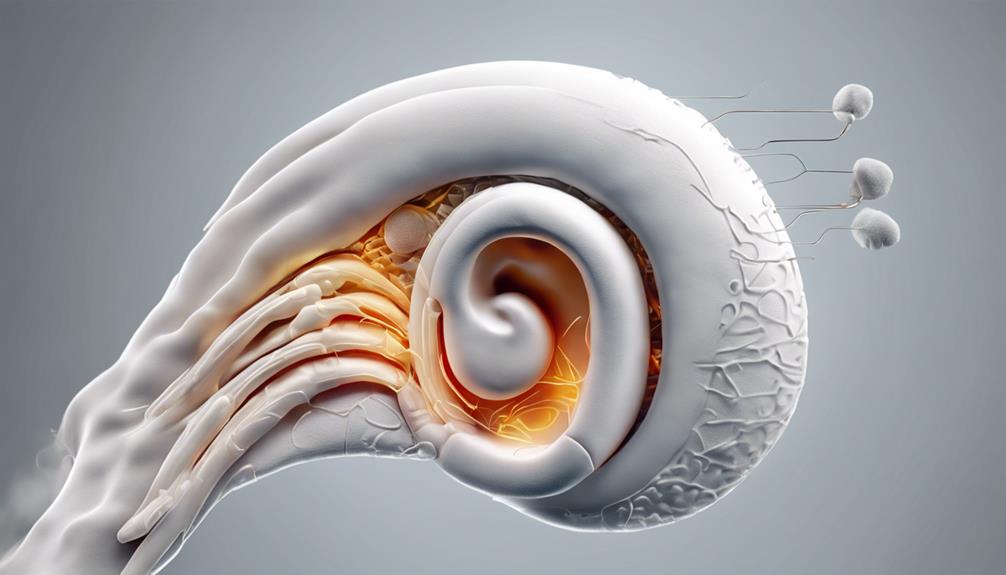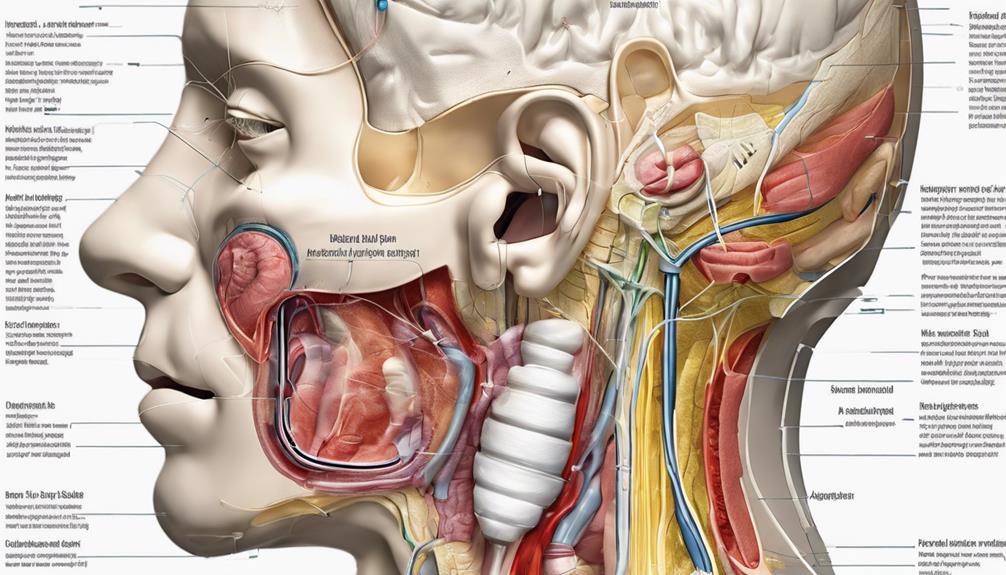Curious about the subtle yet significant link between aspirin and hearing loss? Let’s delve into the intricate process through which this commonly-used medication impacts our auditory abilities.
From the mechanisms behind aspirin-induced damage to the role of salicylates in auditory impairment, exploring the connection between this widely used drug and potential hearing issues promises a deep dive into a lesser-known aspect of medication effects on our bodies.
Key Takeaways
- Aspirin's conversion to salicylic acid harms auditory function.
- Salicylates disrupt neurotransmission, impacting cochlear signaling.
- High aspirin doses lead to reversible hearing damage.
- Monitoring aspirin intake is crucial to prevent tinnitus and hearing loss.

Hearprotek Concert Ear Plugs, 2Pairs Reusable high Fidelity Musician Ear Plugs for Concerts Loud Music-Noise Reduction Ear Protection earplugs for Rave,Festival,Music,Tinnitus Relief
High Fidelity: Hearprotek Music ear plugs do an effective job of bringing down the overall volume, blocking background…
As an affiliate, we earn on qualifying purchases.
As an affiliate, we earn on qualifying purchases.
Mechanisms of Aspirin-Induced Hearing Damage
As we delve into the mechanisms of aspirin-induced hearing damage, it becomes clear that its conversion to salicylic acid in the body plays a crucial role in the toxic effects on the auditory system. When aspirin is metabolized into salicylic acid, it can lead to ototoxic effects, potentially resulting in hearing loss and tinnitus. These effects are reversible if the intake is reduced or discontinued promptly.
The impact of aspirin on cochlear function and neurotransmission pathways within the inner ear contributes to its toxic effects on the auditory nerve. By interfering with these essential pathways, aspirin disrupts the transmission of auditory signals, leading to hearing impairment. Understanding the intricate relationship between aspirin and the inner ear structures is fundamental in comprehending how this medication can induce hearing damage.
Therefore, the potential ototoxicity of aspirin highlights the importance of monitoring its use, especially in individuals susceptible to auditory issues, to prevent adverse effects on cochlear function and neurosensory pathways.

Audiometer Patient Response Button for Hearing Tests | Audiologist-Trusted Audiometry Switch | Rated 500,000+ Clicks | Universal 1/4" Plug | Magnetic for Sound Booths
Designed by a hearing professional for real-world clinical use.
As an affiliate, we earn on qualifying purchases.
As an affiliate, we earn on qualifying purchases.
Role of Salicylates in Auditory Impairment

Salicylates, particularly aspirin, play a significant role in inducing auditory impairment by affecting various components of the auditory system. When exploring the impact of salicylates on auditory function, we find the following key points:
- Neurotransmission Alteration: Salicylates influence neurotransmission in the auditory system, leading to changes in signal processing and potentially causing hyperactivity within the neural pathways associated with hearing.
- Cochlear Amplification: Salicylates can enhance cochlear amplification by modulating the activity of motor protein prestin. This alteration in cochlear function may contribute to the overall changes observed in the auditory system with salicylate exposure.
- Inner Ear Damage: High doses of salicylates have been linked to sustained damage in the inner ear, affecting cochlear function and potentially leading to symptoms such as hearing loss and tinnitus.
Understanding the role of salicylates in auditory impairment provides valuable insights into the mechanisms underlying drug-induced hearing damage.

Integrative Therapeutics AllQlear – Seasonal Supplement for Immune Support *- Quail Egg Powder Blend – Dairy-Free – Berry Flavored, 60 Chewable Tablets (30 Servings)
Seasonal Support*: AllQlear is an immune system support supplement, and it offers fast-acting seasonal support*
As an affiliate, we earn on qualifying purchases.
As an affiliate, we earn on qualifying purchases.
Impact on Cochlear Function
Excessive levels of salicylic acid, a byproduct of aspirin metabolism, can have detrimental effects on cochlear function, potentially leading to hearing-related issues such as tinnitus and reversible hearing loss. When high doses of aspirin are consumed, the toxic effects on the auditory system can manifest as changes in cochlear function, impacting sound perception. To better grasp the impact of aspirin on cochlear function, a deeper understanding of its conversion to salicylic acid and the subsequent effects on auditory mechanisms is crucial.
To emphasize the relationship between aspirin, cochlear function, and hearing loss, consider the following table:
| Aspirin Impact on Cochlear Function | |
|---|---|
| Salicylic acid accumulation | Toxic effects |
| Cochlear function impairment | Hearing loss |
| Auditory system disruption | Tinnitus development |
It is important to note that at the commonly prescribed 81-mg dose of aspirin, the risk of hearing loss is minimal. However, at higher doses, the potential for aspirin-induced hearing issues becomes more significant. Understanding the intricate interplay between aspirin, salicylic acid, and cochlear function sheds light on the mechanisms underlying aspirin-related hearing impairments.
ototoxicity monitoring devices
As an affiliate, we earn on qualifying purchases.
As an affiliate, we earn on qualifying purchases.
Connection Between Aspirin and Tinnitus

When considering the impact of aspirin on auditory function, it becomes evident that a notable connection exists between aspirin usage and the occurrence of tinnitus. Here are three key points to deepen our understanding:
- Salicylic Acid Formation: Aspirin can lead to tinnitus by converting into salicylic acid in the body. This transformation process is linked to the development of tinnitus symptoms.
- Toxic Effects: High levels of aspirin can have toxic effects on the body, potentially resulting in tinnitus. Exceeding recommended dosages can increase the likelihood of experiencing this side effect.
- Dose Consideration: While the 81-mg dose of aspirin is generally regarded as safe for most individuals and isn't associated with a risk of hearing loss or tinnitus, caution should be exercised when higher doses are consumed. Monitoring aspirin intake is crucial to mitigate the risk of tinnitus and other adverse effects.
Understanding the relationship between aspirin and tinnitus is essential in managing the potential risks associated with aspirin use and maintaining optimal hearing health.
Strategies for Hearing Health Protection
To safeguard our auditory well-being, it's crucial to implement proactive measures for hearing health protection. Utilizing ear protection in noisy environments can help prevent noise-induced hearing loss, a condition that can be worsened by aspirin use.
Regular monitoring of our hearing health with audiologists is essential to detect any changes or potential hearing loss early on. It's also important to have open discussions with healthcare providers regarding the risks and benefits of aspirin use, especially if there's a history of hearing issues.
Considering alternative pain relief options that are less likely to cause hearing loss can be a prudent choice for those concerned about aspirin-related ototoxicity. Staying informed about the potential side effects of medications like aspirin on our hearing allows us to proactively protect our auditory health.
Frequently Asked Questions
How Does Aspirin Cause Hearing Loss?
Aspirin can cause hearing loss by converting to salicylic acid in the body, which can be toxic to the auditory system. High aspirin intake can lead to side effects like tinnitus and reversible hearing loss. At the commonly recommended 81-mg dose, there's minimal risk of hearing issues.
The concern arises with high doses exceeding recommendations. Knowing aspirin's potential ototoxic effects is crucial for those who use it regularly or in high amounts.
Can Some Aspirins and Ibuprofen Medicines Cause Deafness When Taken in Huge Amounts?
Yes, aspirin and ibuprofen can cause deafness when taken in massive amounts. These medications, in high doses, may lead to reversible hearing loss and tinnitus.
Think of it like pouring too much salt into a recipe; too much aspirin or ibuprofen can harm your hearing.
It's crucial to monitor intake and stick to recommended doses to prevent potential hearing issues.
What Is the Mechanism of Aspirin Ototoxicity?
At high levels, aspirin can lead to hearing loss by damaging the cochlea. This occurs because aspirin is converted to salicylic acid, which harms the auditory system.
Monitoring symptoms and understanding these effects can help manage hearing issues caused by medications.
Can Taking a 81mg of Aspirin Cause Tinnitus?
We've got your back!
Taking 81mg of aspirin typically doesn't lead to tinnitus. However, higher doses can up the risk of hearing issues. Aspirin changes into salicylic acid in the body, potentially causing trouble for our ears.
If you're worried about this, chatting with healthcare pros is key. So, while a low dose usually keeps tinnitus away, it's wise to keep an eye out for higher amounts.
Conclusion
In conclusion, it's crucial to be mindful of the potential impact of aspirin on hearing health. Understanding the mechanisms of aspirin-induced hearing damage and taking steps to protect our cochlear function is vital.
Remember, 'prevention is better than cure' – so let's prioritize hearing health by seeking advice from healthcare professionals and making informed choices about medication usage.
Let's take care of our ears to ensure a lifetime of good hearing.










